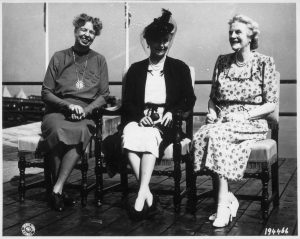1943-1945
Summer 1943 (Age 68)

Winston Churchill, Parliament Square, London © Sue Lowry & Magellan PR
March 20, 2015
On to the Quebec Conference
As the Allies bombed targets in Sicily in preparation for invasion, Churchill pressed for another meeting with FDR. Churchill knew that this was a propitious moment. In a communication with Roosevelt and Eisenhower, he quoted Shakespeare’s Julius Caesar: ‘There is a tide in the affairs of men Which taken at the flood leads on to fortune … And we must take the current when it serves Or lose our ventures.” The present venture was to get onto the Italian mainland as quickly as possible, with Rome as “the bull’s-eye.” Even if the Americans hesitated he was prepared to use British troops, and perhaps Polish troops stationed in Persia, to achieve his objectives in “the soft underbelly.” When he learned that General Marshall agreed he responded, “I am with you heart and soul” and he told Smuts that “we all go the same way home.”
“…we all go the same way home.”
Notwithstanding their troubles in Italy and the fact that the Allies had won the Battle of the Atlantic, the Germans opened an offensive on the Eastern Front; but it was stopped by mid-July after the great tank battle at Kursk. Churchill’s attention was also on the Balkans and the “hardy and hunted guerrillas” of Tito as he prepared to leave for Quebec and a meeting with the American President.
Traveling under the code-name Colonel Warden, Churchill boarded RMS Queen Mary on the Clyde. Despite the attempt at secrecy, large crowds met them at Halifax and at every train stop on the way to Quebec. Churchill’s V-sign was extremely popular. The Churchills were accommodated in the Citadel, the residence of the Governor-General of Canada. The remainder of the 200 people in the British party stayed at the Chateau Frontenac Hotel. The conference was not to begin for a few days so Roosevelt invited Churchill to his home in Hyde Park, New York. Leaving his wife in Quebec, Churchill and his daughter Mary traveled by private rail-car donated by the Canadian National Railways. He wanted to show his daughter Niagara Falls where he was asked what he thought of the natural wonder. “I saw them before you were born,” he replied. “I came here first in 1900.” “Do they look the same?,” he was asked. “Well,”he responded, ‘the principle seems the same. The water still keeps falling over.” For two oppressively hot days Churchill and his daughter visited the Roosevelt home, where they swam and picnicked on hot dogs and hamburgers.
Churchill wanted Brooke and Roosevelt wanted Marshall to command the invasion of Europe. Roosevelt insisted that the position go to an American but eventually he could not bear to be without Marshall in Washington. They agreed that Mountbatten should receive the South-East Asia Command. They also agreed that the atomic bomb would be manufactured in the United States and that they would invite Stalin to meet them, probably in Alaska.
The Quebec conference, code-named Quadrant, began on August 17th. For a break, Churchill, Roosevelt, Hopkins and Harriman visited the Canadian Governor-General’s country retreat where they fished and discussed global strategy in a log cabin in the woods. The conference ended on 24 August and a weary Churchill took his family to a fishing camp in the Laurentian mountains for a few days’ rest. Anthony Eden noted that the Prime Minister “did not look well and was a bad colour. He said to me that he felt the need for a longer change. I urged him to take it.” The mountain air, fishing and shooting the rapids of the Montmorency River revived him.
On his return to Quebec he spoke to the people of Canada where “in mighty lands which have never know the totalitarian tyrannies of Hitler and Mussolini, the spirit of freedom has found a safe and abiding home.” Clementine and Mary Churchill also made radio broadcasts from Quebec.
After Quebec, Churchill went to Washington to discuss a tripartite meeting with Stalin. From there he proceeded to Boston where he received an honorary degree from Harvard. John Martin noted that the academic gowned Churchill “looked like a genial Henry VIII.” Elizabeth Layton said that Churchill had his Harvard audience in the palm of his hand. It was one of his very best deliveries.” The New York Times said that “he has opened up a vast and hopeful field of discussion. Down the grim corridors of war light begins to show.”
The Churchills returned to Washington and then to Hyde Park where they celebrated their thirty-fifth wedding anniversary. Then on to Halifax where they boarded HMS Renown. To the strains of “0 Canada” and “Will ye no come back again?” they headed for home. On the Atlantic crossing Mary Churchill celebrated her 21st birthday. She had been received as enthusiastically as had her father by both their Canadian and American friends.
Subscribe
WANT MORE?
Get the Churchill Bulletin delivered to your inbox once a month.




